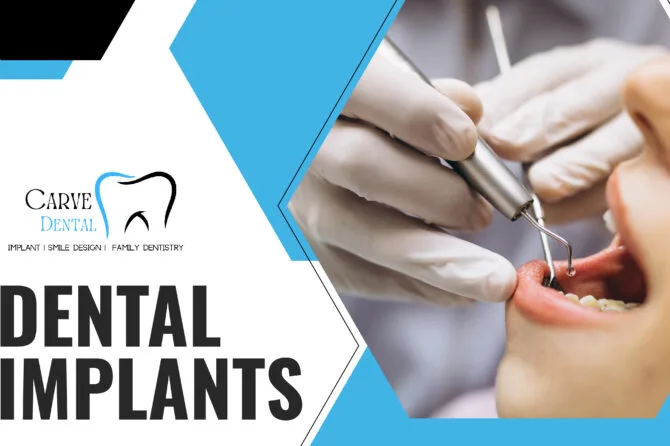
Dental Implants
Dental implants have been a game-changer in the dental industry for replacing missing teeth. With their ability to provide a permanent and natural-looking solution, dental implants have gained immense popularity in recent years. In this blog, we will explore the various aspects of dental implants and why they are considered a superior choice for long-term oral health.
Understanding The Basics and Advancements
Dental implants are posts made of titanium that are surgically implanted into the jawbone. Their purpose is to replicate the function of natural tooth roots. Through a process known as osseointegration, the jawbone gradually bonds with the implants to create a solid and sturdy foundation of replacement teeth.
Restoring Functionality: Improved Chewing and Speaking Abilities
One of the primary advantages of dental implants is their ability to restore functionality. Unlike traditional dentures or bridges, dental implants mimic the natural tooth structure and provide a stable base for chewing and biting. This means that individuals with dental implants can enjoy their favorite foods without any discomfort or dietary restrictions. Additionally, dental implants prevent speech difficulties that may occur with missing teeth, allowing individuals to speak clearly and confidently.
Enhanced Aesthetics: Restoring Natural-Looking Smiles
In addition to functionality, dental implants offer remarkable aesthetic benefits. The replacement teeth attached to the implants are custom-made to match the color, shape, and size of the natural teeth, resulting in a seamless and natural-looking smile. With dental implants, individuals can regain their self-confidence and enjoy the beauty of a complete, radiant smile.
Durability and Longevity: Lifespan Compared to Other Restorative Options
When considering restorative options for missing teeth, durability and longevity are crucial factors. Dental implants outshine other alternatives in this regard. Dental implants may last a lifetime with the right care and maintenance, whereas dentures and bridges could need to be updated every five to ten years. This makes dental implants a cost-effective long-term investment in oral health.
Preserving Jawbone Health: Importance of Implant Stimulation
Did you understand that teeth that are missing can cause the jaw’s bone to deteriorate? Dental implants are essential for maintaining the health of the jawbone. Through the process of osseointegration, the implants stimulate the surrounding bone, preventing bone resorption and maintaining the integrity of the jaw structure. By preserving bone density, dental implants contribute to overall oral health and prevent facial sagging, maintaining a youthful appearance.
Maintenance and Care: Oral Hygiene Practices for Implant Success
Dental implants require similar maintenance to natural teeth. Regular brushing, flossing, and routine dental check-ups are essential to ensure long-term implant success. Good oral hygiene practices, along with avoiding harmful habits like smoking, will help keep the implants and surrounding gum tissues healthy, minimizing the risk of complications.

Improved Confidence and Self-Esteem: Psychological Impact of Dental Implants
Living with missing teeth can take a toll on one’s self-confidence and self-esteem. Dental implants offer a psychological boost by restoring a complete smile and enhancing overall facial appearance. With dental implants, individuals can feel more confident in social situations, leading to improved quality of life and emotional well-being.
Stability and Comfort: Secure Fit and Elimination of Discomfort
Denture wearers often experience discomfort, slippage, and the need for messy adhesives. Dental implants eliminate these issues by providing a secure and comfortable fit. The implants are firmly anchored in the jawbone, ensuring stability and preventing any movement or irritation. This allows individuals to eat, speak, and laugh without worrying about denture-related discomfort.
Preserving Surrounding Teeth: Avoiding Adjacent Tooth Damage with Dental Implants
One of the primary concerns with traditional tooth replacement options such as dental bridges is the potential damage they can cause to the adjacent teeth. Bridges require the alteration of healthy teeth on either side of the gap to serve as support for the artificial tooth. This process involves removing enamel and reshaping the neighboring teeth to accommodate the bridge. Unfortunately, this can weaken the natural teeth and make them more susceptible to decay, fractures, and other dental issues.
Cost-Effectiveness
Dental implants, on the other hand, offer a revolutionary approach that eliminates the need to modify adjacent teeth. The implant is a platinum post which serves as a dental implant root and is surgically inserted into the jawbone. It provides a sturdy and independent foundation for the replacement tooth or implant-supported restoration without relying on neighboring teeth for support.
Leave a reply
Leave a reply